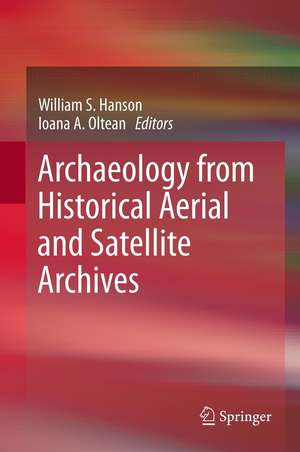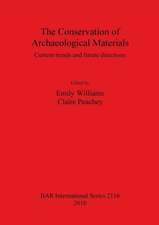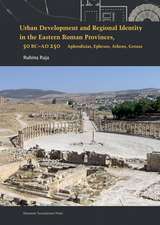Archaeology from Historical Aerial and Satellite Archives
Editat de William S. Hanson, Ioana A. Olteanen Limba Engleză Hardback – 12 noi 2012
| Toate formatele și edițiile | Preț | Express |
|---|---|---|
| Paperback (1) | 643.84 lei 6-8 săpt. | |
| Springer – 13 dec 2014 | 643.84 lei 6-8 săpt. | |
| Hardback (1) | 649.06 lei 6-8 săpt. | |
| Springer – 12 noi 2012 | 649.06 lei 6-8 săpt. |
Preț: 649.06 lei
Preț vechi: 763.60 lei
-15% Nou
Puncte Express: 974
Preț estimativ în valută:
124.20€ • 130.00$ • 103.37£
124.20€ • 130.00$ • 103.37£
Carte tipărită la comandă
Livrare economică 31 martie-14 aprilie
Preluare comenzi: 021 569.72.76
Specificații
ISBN-13: 9781461445043
ISBN-10: 1461445043
Pagini: 368
Ilustrații: XXIV, 344 p.
Dimensiuni: 155 x 235 x 24 mm
Greutate: 0.66 kg
Ediția:2013
Editura: Springer
Colecția Springer
Locul publicării:New York, NY, United States
ISBN-10: 1461445043
Pagini: 368
Ilustrații: XXIV, 344 p.
Dimensiuni: 155 x 235 x 24 mm
Greutate: 0.66 kg
Ediția:2013
Editura: Springer
Colecția Springer
Locul publicării:New York, NY, United States
Public țintă
ResearchCuprins
Table of contents: Introduction
1. William S. Hanson and Ioana A. Oltean, ‘A Spy in the Sky: the potential of historical archival aerial and satellite photography for archaeological research’ Opening doors: aerial and satellite archives
2. David C. Cowley, Lesley M. Ferguson and Alan Williams, ‘The Aerial Reconnaissance Archives: a global aerial photographic collection’
3. Peter McKeague and Rebecca H. Jones, ‘Blitzing the Bunkers: finding aids - past, present and future.’
4. Martin J.F. Fowler, ‘Declassified intelligence satellite photographs.’ Historical aerial and satellite photographs in archaeological research
5. Birger Stichelbaut, Wim De Clercq, Davy Herremans and Jean Bourgeois, ‘First World War aerial photography and medieval landscapes: moated sites in Flanders.’
6. Tony Pollard and Peter Barton, ‘The use of First World War aerial photographs by archaeologists: a case study from Fromelles, northern France.’
7: Andrew Young, ‘Historic Vertical Photography and Cornwall’s National Mapping Programme’
8: Patrizia Tartara, ‘The Use of Historical Aerial Photographs in Italy: Some Case Studies’
9. Ioana A. Oltean, ‘A Lost Archaeological Landscape on the Lower Danube Roman Limes: The Contribution of Second World War Aerial Photographs
10. Zsolt Visy, ‘The Value and Significance of Historical Air Photographs for Archaeological Research: Some Examples from Central and Eastern Europe’
11. Iván Fumadó Ortega and José Carlos Sánchez-Pardo, ‘Archaeology from Aerial Archives in Spain andPortugal: Two Examples from the Atlantic Seaboard’
12. Natal’ya S. Batanina and Bryan K. Hanks, ‘Soviet Period Air Photography and Archaeology of the Bronze Age in the Southern Urals of Russia’
13. Robert Bewley and David Kennedy, ‘Historical Aerial Imagery in Jordan and the Wider Middle East’
14. José Iriarte, ‘“Down Under in the Marshes”: Investigating Settlement Patterns of the Early Formative Mound-Building Cultures of South-Eastern Uruguay Through Historic Aerial Photography’
15. Anthony Beck and Graham Philip, 'The archaeological exploitation of declassified satellite photography in semi-arid environments.'
16. Rog Palmer, ‘Uses of Declassified corona Photographs for Archaeological Survey in Armenia
17. Damian Evans and Elizabeth Moylan, ‘Pixels, Ponds and People: Mapping Archaeological Landscapes in Cambodia Using Historical Aerial and Satellite Imagery’
18. Ioana A. Oltean and William S. Hanson, ‘Integrating Aerial and Satellite Imagery: Discovering Roman Imperial Landscapes in Southern Dobrogea (Romania)’
1. William S. Hanson and Ioana A. Oltean, ‘A Spy in the Sky: the potential of historical archival aerial and satellite photography for archaeological research’ Opening doors: aerial and satellite archives
2. David C. Cowley, Lesley M. Ferguson and Alan Williams, ‘The Aerial Reconnaissance Archives: a global aerial photographic collection’
3. Peter McKeague and Rebecca H. Jones, ‘Blitzing the Bunkers: finding aids - past, present and future.’
4. Martin J.F. Fowler, ‘Declassified intelligence satellite photographs.’ Historical aerial and satellite photographs in archaeological research
5. Birger Stichelbaut, Wim De Clercq, Davy Herremans and Jean Bourgeois, ‘First World War aerial photography and medieval landscapes: moated sites in Flanders.’
6. Tony Pollard and Peter Barton, ‘The use of First World War aerial photographs by archaeologists: a case study from Fromelles, northern France.’
7: Andrew Young, ‘Historic Vertical Photography and Cornwall’s National Mapping Programme’
8: Patrizia Tartara, ‘The Use of Historical Aerial Photographs in Italy: Some Case Studies’
9. Ioana A. Oltean, ‘A Lost Archaeological Landscape on the Lower Danube Roman Limes: The Contribution of Second World War Aerial Photographs
10. Zsolt Visy, ‘The Value and Significance of Historical Air Photographs for Archaeological Research: Some Examples from Central and Eastern Europe’
11. Iván Fumadó Ortega and José Carlos Sánchez-Pardo, ‘Archaeology from Aerial Archives in Spain andPortugal: Two Examples from the Atlantic Seaboard’
12. Natal’ya S. Batanina and Bryan K. Hanks, ‘Soviet Period Air Photography and Archaeology of the Bronze Age in the Southern Urals of Russia’
13. Robert Bewley and David Kennedy, ‘Historical Aerial Imagery in Jordan and the Wider Middle East’
14. José Iriarte, ‘“Down Under in the Marshes”: Investigating Settlement Patterns of the Early Formative Mound-Building Cultures of South-Eastern Uruguay Through Historic Aerial Photography’
15. Anthony Beck and Graham Philip, 'The archaeological exploitation of declassified satellite photography in semi-arid environments.'
16. Rog Palmer, ‘Uses of Declassified corona Photographs for Archaeological Survey in Armenia
17. Damian Evans and Elizabeth Moylan, ‘Pixels, Ponds and People: Mapping Archaeological Landscapes in Cambodia Using Historical Aerial and Satellite Imagery’
18. Ioana A. Oltean and William S. Hanson, ‘Integrating Aerial and Satellite Imagery: Discovering Roman Imperial Landscapes in Southern Dobrogea (Romania)’
Recenzii
From the reviews:
“Hanson, Oltean, and 27 colleagues (mostly British) focus on historical aerial and satellite images, motivated by a NATO-sponsored workshop (2000) and a 2007 conference on aerial photography. The editors provide informative discussions on the existence, scope, and potential access to images. … The 18 chapters are supplemented by 101 figures (28 in color) and four tables. … Summing Up: Recommended. Upper-division undergraduates and above.” (C. C. Kolb, Choice, Vol. 50 (10), June, 2013)
“Hanson, Oltean, and 27 colleagues (mostly British) focus on historical aerial and satellite images, motivated by a NATO-sponsored workshop (2000) and a 2007 conference on aerial photography. The editors provide informative discussions on the existence, scope, and potential access to images. … The 18 chapters are supplemented by 101 figures (28 in color) and four tables. … Summing Up: Recommended. Upper-division undergraduates and above.” (C. C. Kolb, Choice, Vol. 50 (10), June, 2013)
Notă biografică
Bill Hanson is the author or co-author of 4 books/monographs and editor or co-editor of 4 more, with over 100 published papers to his name in the fields of Roman and aerial archaeology. He has been active in aerial photographic research for over 25 years, having directed aerial survey programmes in both Scotland and Romania. He teaches archaeological remote sensing to undergraduates and for over 10 years has been responsible for a postgraduate taught Masters programme on aerial archaeology, currently the only one of its kind in Europe. Ioana Oltean is a Lecturer in Archaeology at the University of Exeter where, amongst other things, she teaches an undergraduate module on aerial archaeology. Her research in Roman Dacia and Moesia has focused on the utilisation of aerial and satellite data, including archival material, for the elucidation of landscape evolution. She has published one book and several papers on this theme, and undertaken her own aerial survey programme in Romania.
Textul de pe ultima copertă
Major international historical archives of declassified military reconnaissance photographs and satellite images, combined with a range of national collections of vertical photographs, offer considerable potential for archaeological and historical landscape research. They provide a unique insight into the character of the landscape as it was over half a century or more ago, before the destructive impact of intensive land use and development. Millions of such images are held in archives around the world, yet their research potential goes largely untapped.
Archaeology from Historical Aerial and Satellite Archives draws attention to the existence and scope of these historical photographs to encourage their use in archaeological and landscape research. Not only do they provide a high-quality photographic record of the pre-modern landscape, but they also offer the prospect of the better survival of archaeological remains surviving as earthworks or cropmarks. These sources of imagery also provide an opportunity to examine areas of Europe and beyond whose skies are still not open to archaeological aerial reconnaissance.
Featured in the coverage:
By describing this massive resource, providing examples of its application to archaeological/landscape questions, and offering advice on access, Archaeology from Historical Aerial and Satellite Archives demonstrates its huge potential and encourages its further use, stimulating a new approach to archaeological survey and the study of landscape evolution among archaeologists, historians, social scientists, preservationists, and cultural heritage specialists.
Archaeology from Historical Aerial and Satellite Archives draws attention to the existence and scope of these historical photographs to encourage their use in archaeological and landscape research. Not only do they provide a high-quality photographic record of the pre-modern landscape, but they also offer the prospect of the better survival of archaeological remains surviving as earthworks or cropmarks. These sources of imagery also provide an opportunity to examine areas of Europe and beyond whose skies are still not open to archaeological aerial reconnaissance.
Featured in the coverage:
- The archaeological potential of The Aerial Reconnaissance Archives in Edinburgh and the archive of declassified intelligence satellite photographs of the United States Geological Survey.
- First World War aerial photography and medieval landscapes.
- Second World War and post-war aerial photography in multi-period archaeological research in Britain, Hungary, Italy, Jordan, Portugal, Romania, Russia, Spain and Uruguay
- The archaeological exploitation of declassifiedUS satellite photography in Armenia and Syria.
- The integration of historical aerial and satellite photography for archaeological landscape research in Cambodia and Romania.
By describing this massive resource, providing examples of its application to archaeological/landscape questions, and offering advice on access, Archaeology from Historical Aerial and Satellite Archives demonstrates its huge potential and encourages its further use, stimulating a new approach to archaeological survey and the study of landscape evolution among archaeologists, historians, social scientists, preservationists, and cultural heritage specialists.
Caracteristici
uses declassified military reconnaissance images for archaeological research explains the "how-to" of using and accessing historical archived military data includes photographs from WWI to the present day





